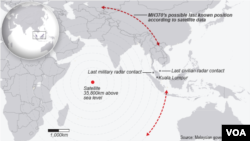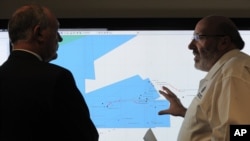BANGKOK, THAILAND —
Malaysia says 25 countries are involved in the search for the missing Malaysian Airlines passenger jet that disappeared from radar more than a week ago. Analysts are calling for greater regional cooperation in air safety and security.
Malaysia's acting transport minister, Hishammuddin Hussein, said Sunday the search for the missing Malaysian Boeing 777 aircraft has increased to 25 countries and a focus on two key flight corridors, one to the Indian Ocean and another extending as far north as Central Asia.
Hishammuddin told a press briefing in Kuala Lumpur the extended search areas raised fresh challenges as hopes of finding the aircraft increasingly lay with satellite data.
"The search area has been significantly expanded and the nature of the search has changed," said Hishammuddin. "From focusing mainly on shallow seas, we are now looking at large tracks of land crossing 11 countries as well as deep and remote oceans. The number of countries involved in the search and rescue operation has increased from 14 to 25 which brings new challenges of coordination and diplomacy."
Hishammuddin also called for the United States, China and France, among others, to provide further satellite details in the search for the aircraft.
Senior Malaysian police officers say a formal investigation into the captain and the co-pilot of flight MH370 is under way with raids on their residences in upscale suburbs of Kuala Lumpur. But families and friends of the men have vouched for their good character.
The aircraft left Kuala Lumpur last Saturday morning on a regular flight to Beijing with 239 passengers and crew, but never reached its scheduled destination.
On Saturday, Malaysia's Prime Minister Najib Razak said "deliberate action" on board led to the flight to change its course and fly due west. Investigations say the flight may have carried on for several hours. Transponders attached to the aircraft's engines were sending data. Analysis of data indicates the aircraft may have at some time been on the ground.
Sunday it was revealed that prior to a final exchange of "good night" to Kuala Lumpur air traffic control, the aircraft's vital communications addressing and reporting system or ACARS was shut down. This came as the plane's identification transponder had also been turned off deliberately.
Analysts say only persons knowledgeable of aircraft would have taken such steps to shut down such communication and tracking systems.
United States officials say the missing aircraft is likely to have been an "act of piracy" as the search focuses on two corridors north-west from Thailand to the Kazakhstan-Turkmenistan border, and another extending to the southern Indian Ocean.
Defense analyst Carl Thayer, with Australia's University of New South Wales, says problems in the search point to the need for greater regional cooperation in air safety, especially between key powers such as the United States and China. Chinese authorities have also been critical of Malaysia's efforts to reveal information, as most passengers on board were Chinese nationals.
"The lesson is that the major powers have got to learn how to cooperate," Thayer said. "[But] the prime responsibility when the plane supposedly went down in the South China Sea - Gulf of Thailand - is with Malaysia. From my reading at the beginning Malaysia was very even-handed. But once you have the plane turning west, China was just left standing there. Then it moved to areas where India and the United States were better able to respond."
Thayer says regional bodies such as the Association of Southeast Asian Nations (ASEAN) and regional partners need to apply earlier agreements on security and safety reached after the September 11, 2001 attacks in the United Sates. He also pointed to operational complacency as a factor that can undermine air security and passenger safety.
Malaysia's acting transport minister, Hishammuddin Hussein, said Sunday the search for the missing Malaysian Boeing 777 aircraft has increased to 25 countries and a focus on two key flight corridors, one to the Indian Ocean and another extending as far north as Central Asia.
Hishammuddin told a press briefing in Kuala Lumpur the extended search areas raised fresh challenges as hopes of finding the aircraft increasingly lay with satellite data.
"The search area has been significantly expanded and the nature of the search has changed," said Hishammuddin. "From focusing mainly on shallow seas, we are now looking at large tracks of land crossing 11 countries as well as deep and remote oceans. The number of countries involved in the search and rescue operation has increased from 14 to 25 which brings new challenges of coordination and diplomacy."
Hishammuddin also called for the United States, China and France, among others, to provide further satellite details in the search for the aircraft.
Senior Malaysian police officers say a formal investigation into the captain and the co-pilot of flight MH370 is under way with raids on their residences in upscale suburbs of Kuala Lumpur. But families and friends of the men have vouched for their good character.
The aircraft left Kuala Lumpur last Saturday morning on a regular flight to Beijing with 239 passengers and crew, but never reached its scheduled destination.
On Saturday, Malaysia's Prime Minister Najib Razak said "deliberate action" on board led to the flight to change its course and fly due west. Investigations say the flight may have carried on for several hours. Transponders attached to the aircraft's engines were sending data. Analysis of data indicates the aircraft may have at some time been on the ground.
Sunday it was revealed that prior to a final exchange of "good night" to Kuala Lumpur air traffic control, the aircraft's vital communications addressing and reporting system or ACARS was shut down. This came as the plane's identification transponder had also been turned off deliberately.
Analysts say only persons knowledgeable of aircraft would have taken such steps to shut down such communication and tracking systems.
United States officials say the missing aircraft is likely to have been an "act of piracy" as the search focuses on two corridors north-west from Thailand to the Kazakhstan-Turkmenistan border, and another extending to the southern Indian Ocean.
Defense analyst Carl Thayer, with Australia's University of New South Wales, says problems in the search point to the need for greater regional cooperation in air safety, especially between key powers such as the United States and China. Chinese authorities have also been critical of Malaysia's efforts to reveal information, as most passengers on board were Chinese nationals.
"The lesson is that the major powers have got to learn how to cooperate," Thayer said. "[But] the prime responsibility when the plane supposedly went down in the South China Sea - Gulf of Thailand - is with Malaysia. From my reading at the beginning Malaysia was very even-handed. But once you have the plane turning west, China was just left standing there. Then it moved to areas where India and the United States were better able to respond."
Thayer says regional bodies such as the Association of Southeast Asian Nations (ASEAN) and regional partners need to apply earlier agreements on security and safety reached after the September 11, 2001 attacks in the United Sates. He also pointed to operational complacency as a factor that can undermine air security and passenger safety.









